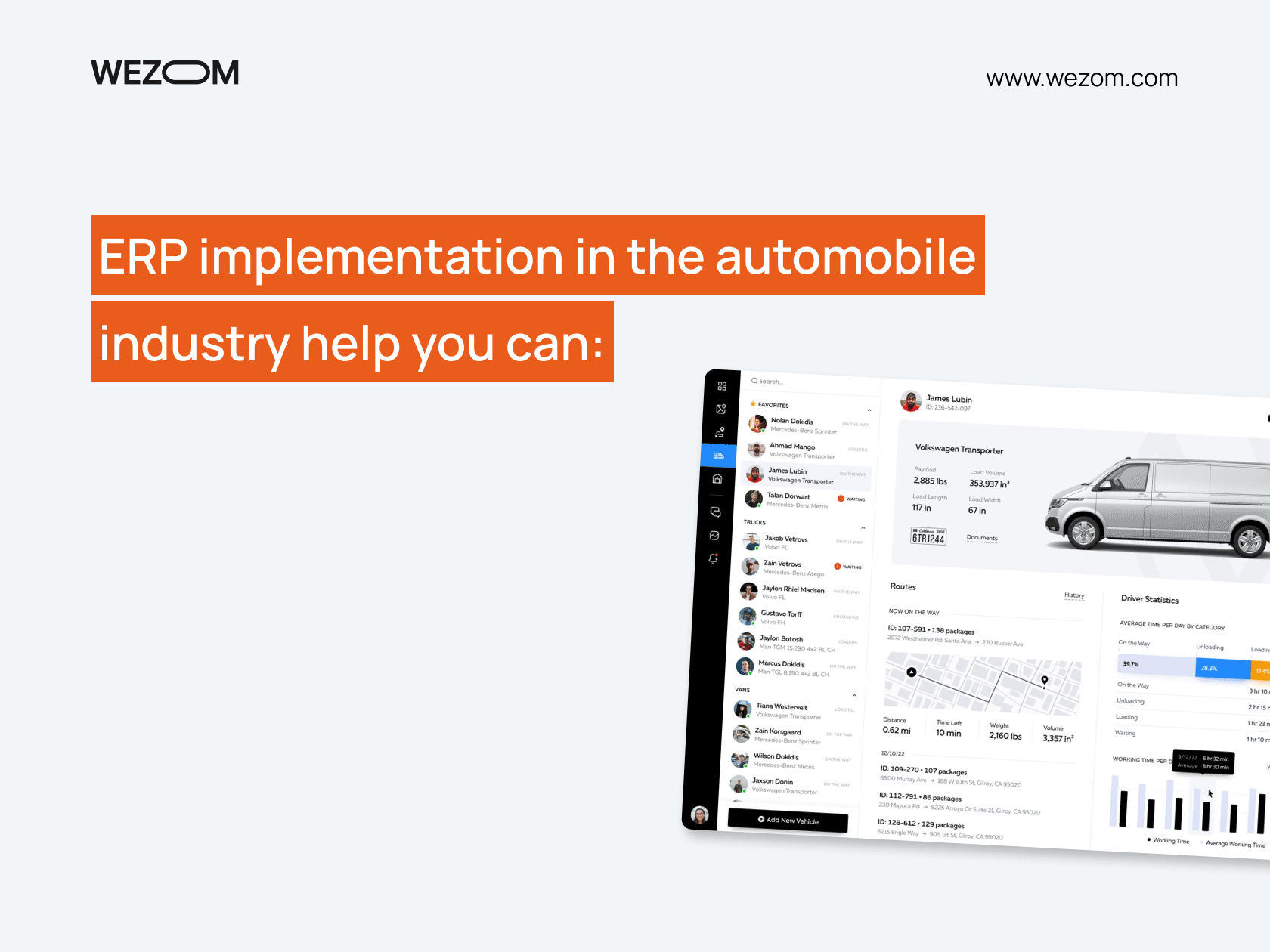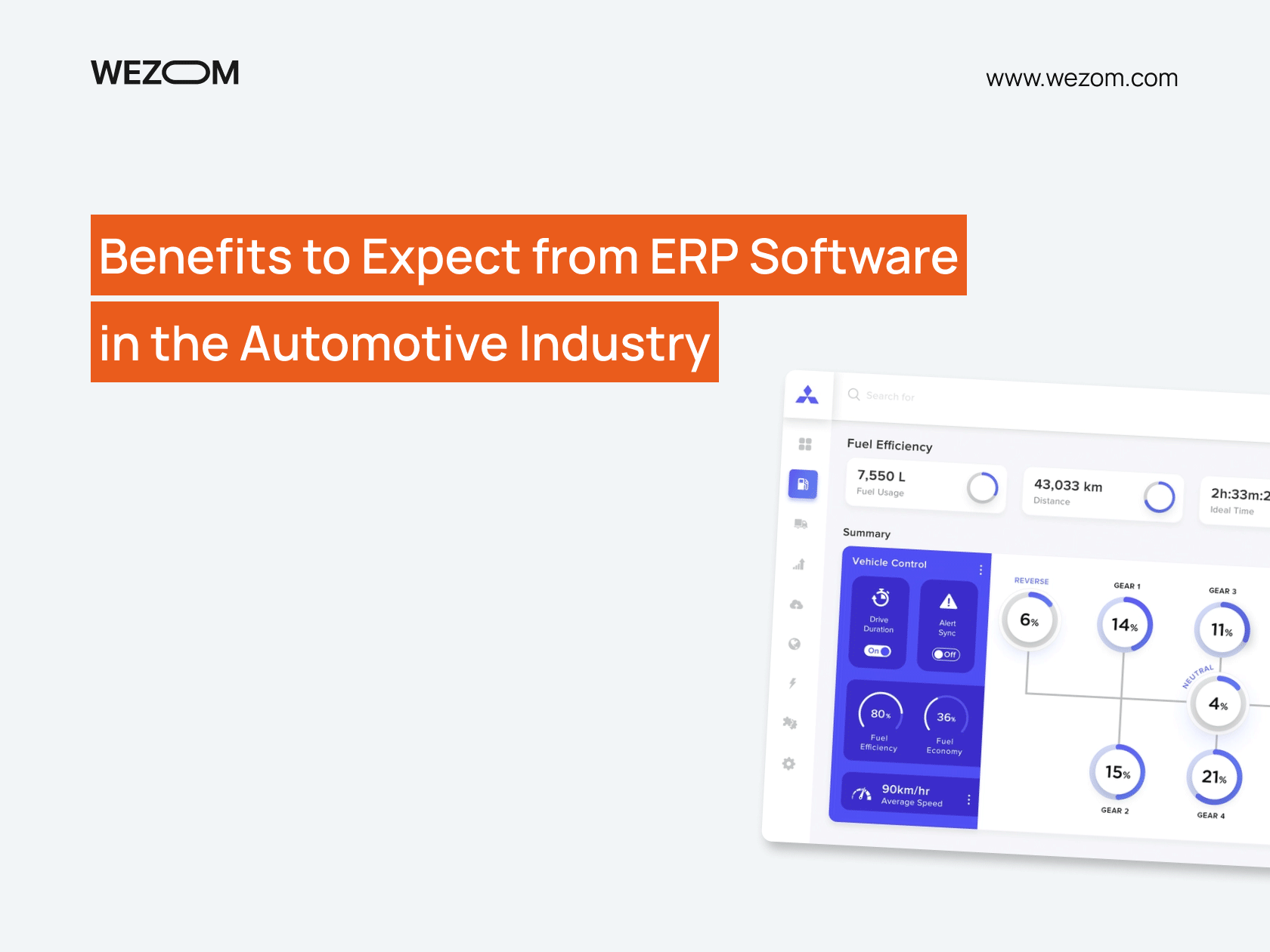ERP, or enterprise resource planning software, is a type of a software solution that is used for managing enterprise resources. An ERP system integrates a set of business processes, including planning, production, purchases, finance, logistics and more. In the automotive industry, ERP software help optimize the work, enhance the enterprise’s efficiency, reduce costs, and improve the quality of goods.
Today, we will talk in detail about how automotive ERP solutions work, what benefits they provide, and what factors you should pay attention to before implementing such software.

Challenges facing the automotive industry
The automotive industry has been one of the most dynamic and competitive industries in the world for several years now. At the same time, it is regularly exposed to various factors:
- changing consumer preferences and requirements;
- development of new technologies;
- tightening of regulatory and legal regulation and quality standards;
- increased global competition;
- the need to manage a complex and extensive supply chain.
To overcome all these challenges and more, automotive businesses need a flexible, reliable and integrated resource management system that can provide accurate demand and production planning, efficient inventory management, distribution and delivery optimization, quality control and compliance with standards, increasing the level of customer satisfaction and more.
Key Vertical Segments of the Automotive Industry
This industry is built on many vertical segments, which can be divided into three main blocks:
- Multi-level automotive industry suppliers;
- auto parts market;
- Automotive component manufacturers;
We propose to consider them in more detail in order to better understand how ERP for the automotive industry can work here.
Multi-level Automotive Industry Suppliers
Imagine the following diagram: Tier 1 suppliers supply engines, transmissions and suspensions for automobiles, Tier 2 suppliers provide components for Tier 1 products such as pistons, valves, springs, etc., and Tier 3 suppliers supply 3) - raw materials and basic parts for Tier 2.
For such a complex structure, the introduction of ERP implementation in the automobile industry is an urgent need, because with its help you can:
- coordinate requirements and specifications with customers and suppliers;
- comply with deadlines and high quality standards;
- optimize the costs and resources of enterprises;
- manage complex document flow;
- manage risks more effectively.
Without an ERP system, such a multi-level chain can literally “fall apart under its own weight”. And it's not a joke.

Auto Parts Market
This is a huge layer of companies that are engaged in the production and sale of automotive parts, accessories, tires, oils and many other products. For the production and supply chain to work properly, a business needs an ERP system that can:
- manage a large number of SKUs (stock keeping units);
- optimize procurement, warehouse processes and logistics;
- integrate with different sales channels;
- provide comprehensive analytics on all aspects of the work.
And this is not the whole list of tasks that an ERP system should optimize. There are many more!
Automotive Parts Manufacturers
The situation with the component market is similar. Companies that produce various parts and components for cars, such as engines, transmissions, suspensions, brake systems, electronics, are no less in need of high-quality ERP systems that help:
- maintain a complex and flexible production structure;
- manage the development, testing, certification and launch of new products;
- optimize production processes at all levels.
And many many other things!

Benefits to Expect from ERP Software in the Automotive Industry
Now let's take a closer look at what advantages and opportunities modern ERP systems open up for the automotive business today.
Reduce Costs and Improve ROI
This is perhaps one of the main advantages. ERP allows you to reduce losses from surplus, scrap and downtime, reduce procurement costs, optimize warehousing, increase sales revenue, improve financial flow management, and use enterprise resources and equipment more efficiently. Even if we consider the automotive aftermarket ERP, such systems are also actively used here.
Analytics and Reports
By implementing an ERP system, you will be able to collect and process large amounts of data more efficiently, create relevant and accurate reports, use visualization tools, make more informed decisions, track KPIs, detect problems in a timely manner and fix them at all levels of business.
Productivity Increase
This is another important advantage, because thanks to ERP you have the opportunity to automate many routine tasks, detect and eliminate errors in work, synchronize and optimize various business processes, increase company flexibility and even increase staff motivation.
Improved customer service
In this regard, ERP systems also provide obvious advantages: they allow you to provide customers with up-to-date and accurate information about the company's products, provide faster order fulfillment, increase the convenience of feedback, and generally increase the satisfaction and loyalty of the target audience.
Intelligent Production and Stock Management
An ERP system makes it possible to more accurately plan demand and production based on historical data, correctly allocate company resources, quickly respond to changes in demand, minimize surpluses, maintain the required level of inventory and reduce product losses for one reason or another.
Warehouse Management and Optimization
Thanks to ERP systems, you can effectively manage a large number of SKUs, optimize warehouse processes, automate the processes of acceptance, shipment, inventory of a warehouse, set up integration with RFID systems, and generate accurate and up-to-date stock analytics.
Electronic Document Management and Collaboration
You can also work with documents much more efficiently: digitize, store and process all types of documents, provide secure access to them, speed up workflow, establish cooperation between different business participants, improving communication and coordination.
Data Security and Compliance
And, of course, do not forget about safety. ERP-systems allow you to effectively protect company data from unauthorized access, encrypt and backup it, manage risks, increase the credibility of the company and its reputation in the automotive market.

Factors to Keep in Mind Before Implementing ERP Software in the Automotive Industry
So you've made the decision to use ERP for automotive dealers and suppliers. It would seem that it is enough to choose a suitable ERP system, integrate it into the company structure in a few days or even hours, and you can work.
But things are a little more complicated…
In practice, there are a lot of factors to consider:
- The degree of readiness of the company to implement ERP. You must understand whether the company has the necessary resources (financial and human), whether employees can adapt to innovations, whether you have the time and effort to implement such a system.
- Service provider selection. There are already quite a few such providers. Some offer ready-made “boxed” solutions, others (like us) offer individual ERP systems that are literally “assembled” according to the requirements of the client.
- List of services you need. Again, different vendors have different systems, features, and uses. Choosing the wrong one can end up costing you dearly.
- The versatility of an ERP system. Flexibility and customization are extremely important parameters. But at the same time, over-generalization can make the system overloaded and redundant for you.
- Platform security. Everything is obvious here - the ERP-system should be as safe, reliable and trouble-free as possible.
The most important piece of advice we can give is: take your time! Explore different options, compare offers, decide what exactly you expect from an ERP system. And only after that make a decision!
How Does WEZOM Help with ERP for the Automotive Industry?
We create and adapt automotive ERP software for each client, taking into account his needs and business specifics. This approach has both advantages and disadvantages, and we talk about them openly.
- The main plus is that our system will be tailored specifically to your business and needs. It is modular, flexible in customization and scalable.
- The disadvantage is that its development takes time, and the cost is higher than ready-made “boxed” solutions, which are often distributed by subscription.
In general, we have already written more than once about what our ERP systems are better than their counterparts in, and what they are inferior to them. Check out the additional information on the website or contact our manager for a consultation. He will tell you what we are ready to offer you.
